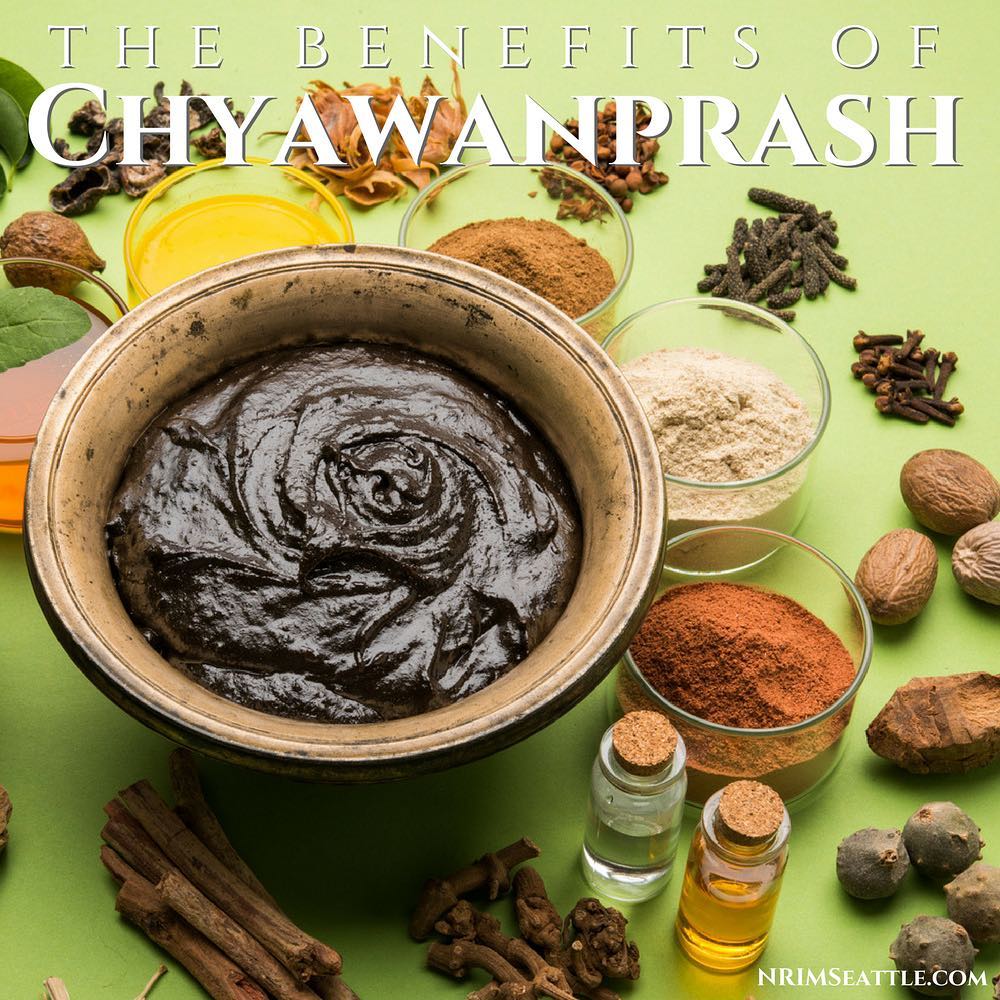Chyawanprash is a traditional anti-aging, rejuvenating, antioxidant, Ayurvedic Superfood created by the combination of 40+ herbal ingredients that are prepared into an Herbal Jam.
This supplement has its roots in original Ayurvedic texts like Charaka Samhita, thus having over 1000 year recorded history of successful use and health benefits. The origins of this formula have even been attributed to legendary divine intervention to restore youth and vigor to a feeble and old Indian sage name Chyawana.
“It is said, Sage Chyawan was born prematurely and therefore experience great health challenges. This troubles included weakness and degeneration of all body tissues leading to early aging. As Sage Chyawan had counseled and aided a king in protection and preservation of the kingdom, he was offered marriage to a princess of this kingdom. But, an aging and feeble Sage Chyawan could not marry and satisfy a young and vibrant princess. This dilemma was addressed by the Divine Twins Ashwini Kumara. The Twins provided the Sage with the gift of this formulation. By taking the herbal jam, Sage Chyawan became restored in his youth, strength, and vigor. Thus, becoming worthy of marriage to the princess. From this time, the formula became known as Chyawan-prash”
Health Benefits of Chyawanprash:
- Anti-oxidant rejuvenative and immune booster: The lead herb, Amla (Emblica officinalis) has been proven to have anti-oxidant effects the reduce degenerative effects of inflammation.1 It has been found to be anti-cancerous and anti-mutation in its actions.2 Protecting from developing cancer.
- Heart Health: chyawanprash improves strength of heart, by improving force of contraction of the heart muscle. This increases blood and nutrition supply to tissues. Chyawanprash is also found to lower cholesterol and improve lipid profile.9,10
- Lung Health: Dashamoola (10 roots), pippali, cardamom, cinnamon and more contribute to nourishment and protection to the lungs. Chyawanprash has been studied and found to improve health of individuals affected by a lung infection of tuberculosis.3 Chyawanprash improved health outcomes when it was included as part of regular treatment of this lung infection.
- GI Health: Chyawanprash enhances hunger, reduces bloating, controls hyperacidity, and improves digestion. Therefore, it has been found effective in reducing gastritis, peptic ulcers, and intestinal cramping.4 It also contain power liver-protective herbs like bhumyamalaki (Phyllanthus n.) that prevent damage and strengthen liver functions, including metabolism of fat and proteins5.
- Libido and Vitality: containing herbs like Ashwagandha, Shatavari, Gokshura and more Chyawanprash has been ascribed improvement of hormonal levels and functional balance in the body. It has been shown to improve semen thickness in men and regulate women’s menstrual cycle.6,7 Ashwagandha alone “demonstrated statistical increase in sperm concentration (167%), semen volume (59%), sperm motility (57%), serum testosterone (17%) and luteinizing hormone (34%) levels” in men with low sperm count after 90 days of use.8
Ayurvedic perspective on Chyawanprash:11,12
Chyavanprash primarily balances the Vata and Kapha dosha… In Charaka Samhita, Chyawanprash is described as “Paramukto Rasayana:”, meaning it is the best rejuvenator and anti-aging medicines. Sage Charaka describes specific benefits of Chyawanprash as follows: This formula is used in treatment of Cough, Asthma, Lung injury, Cardiac diseases, Degenerative Urinary disorders, and boosting reproductive health of men and women. As it improves overall health, the nervous system also gets benefit from Chyawanprash. Sage Charaka describes improved quality of intelligence and memory as main benefits to the mind with regular use of Chyawanprash.
How to take Chyawanprash:
**This article is not intended diagnostic and treatment purposes. Please, contact your physician or our clinic for health consultation before using Chyawanprash for treatment of any condition.
For healthy individuals Chyawanprash can be taken daily. However, dosing and administration changes by age of the individual. Traditionally, Chyawanprash is ideally taken with milk. If you have dairy allergies, take with a milk substitute or with food.
- For Children age 2-5: take 1/8 tsp in the morning before food or with milk.
- For Kids age 5-8yo: take ¼ – ½ tsp in the morning with food or milk.
- For 8-15 year old: ½ – 1 tsp in the morning with food or with milk.
- For 14 years and above: 1 tsp to 1 tbsp in morning before food or with milk.
Traditionally produced Chyawanprash by Natural Rhythms
Subscribe to our podcast: Spotify and Apple Podcast
References:
- Jeena KJ and Kuttan R. Antioxidant Actiity of Emblica officinalis, Clin Biochem Nut, 19 (1995) 63.
- Jeena KJ, Kuttan G, et al. Antimutagenic and anticarcinogenic activity of Emblica officinalis, J Clin Biochem Nut, 22 (1997) 171.
- Ojha JK, Khanna NN, et al. A clinical study on Chyavanprash as an adjuvant in the treatment of pulmonary tuberculosis, J Res Ind Med, 10 (1975) 1.
- Rohit Sharma, Natália Martins, et. al. Chyawanprash: A Traditional Indian Bioactive Health Supplement, Biomolecules. 2019 May; 9(5): 161. Published online 2019 Apr 26.
- Jose J.K., Kuttan R. Hepatoprotective activity of Emblica officinalis and Chyawanprash. J. Ethnopharmacol. 2000;72:135–140.
- Verma M.D., Singh R.H., Upadpa K.N. Physiological, endocrine and metabolic studies on the effect of rasayana therapy in aged persons. J. Res. Ind. Med. 1973;8:1–10
- Shastri A.D. BhaishjyaRatnavali. Chaukhambha Sanskrit Bhawan; Varanasi, India: 1996. 286p.
- Durg S., Shivaram S.B., Bavage S. Withania somnifera (Indian ginseng) in male infertility: An evidence-based systematic review and meta-analysis. Phytomedicine. 2018;50:247–256.
- Thakur CP, Thakur B, et al. The Ayurvedic medicines Haritaki, Amla, Bahira reduce cholesterol induced atherosclerosis in rabbits, Int J Cardiol, 21 (1988) 167.
- Manjuntha S, Jaryal AK, et al. Effect of Chyavaprash and Vitamin on glucose tolderance and lipoprotein profile, Ind J. Physio Pharmacol, 45 (2001), 71.
- Charak Samhita, Chikitsasthanam, II, (Motilal Banarasidas, Banaras), 1954, 7.
- Sharma PV, Cakradatta: A Treatise on Principles and Practices of Ayurvedic Medicine (Chaukhamba Orientalia, Varanasi), 1954, 129.




